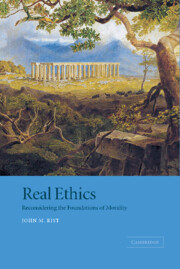Book contents
- Frontmatter
- Contents
- Acknowledgements
- Introduction: Ethical crises old and new
- 1 Moral nihilism: Socrates vs. Thrasymachus
- 2 Morals and metaphysics
- 3 The soul and the self
- 4 Division and its remedies
- 5 Rules and applications
- 6 The past, present and future of practical reasoning
- 7 Autonomy and choice
- 8 Ethics and ideology
- 9 God and ethics
- Bibliography
- Index
5 - Rules and applications
Published online by Cambridge University Press: 16 January 2010
- Frontmatter
- Contents
- Acknowledgements
- Introduction: Ethical crises old and new
- 1 Moral nihilism: Socrates vs. Thrasymachus
- 2 Morals and metaphysics
- 3 The soul and the self
- 4 Division and its remedies
- 5 Rules and applications
- 6 The past, present and future of practical reasoning
- 7 Autonomy and choice
- 8 Ethics and ideology
- 9 God and ethics
- Bibliography
- Index
Summary
SOME USES OF RULES
As we have seen, there are two sides to the problematic of morality: moral agent and moral object or aim. In this chapter I shall consider a link between them, namely the moral principle or rule. From the role of rules and principles in possible accounts of moral behaviour we can shed light on both the nature of moral facts, if any, and on significant features of the genuinely moral agent.
I will begin by observing that unless rules perform as ‘primitives’ in a metaphysical universe – which is obviously impossible for the non-realist about values and also wholly implausible for the moral realist – they are to be viewed as means to ends, so we have to identify the nature and function of such moral means and their role in the formation of the moral agent. We shall then be in a position to consider two notorious puzzles in normative ethics: the problem of ‘dirty hands’ – believing oneself obliged to do things which seem morally wrong – and the problem of the relation between fairness and justice (in what circumstances and by what criteria should people be treated equally?). One of the reasons for the popularity of rule-based ethics is that rules seem necessary if fairness and ‘rights’ are to be enforced.
Since the proper status of rules and principles is obscured by the abuses of legalism and hypocrisy, as well as by difficulties about their application, we may usefully begin by determining how those with a proper respect for rules can be distinguished from narrow legalists and bigots with whom they are often (if sometimes malevolently) confused.
Information
- Type
- Chapter
- Information
- Real EthicsReconsidering the Foundations of Morality, pp. 119 - 139Publisher: Cambridge University PressPrint publication year: 2001
